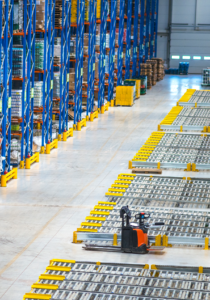Amazon Suppliers:
Amazon Suppliers: Are you looking to expand your Amazon FBA business by sourcing products from noncommercial suppliers? Chancing the right suppliers can be a game-changer, helping you increase your profit perimeters and offer a wider range of products to your guests. But how exactly do you go about changing these noncommercial suppliers? In this composition, we will guide you through the process of changing the perfect noncommercial supplier for your Amazon FBA Wholesale business.
We will give you precious tips and strategies to help you navigate through the inviting number of options and make informed opinions. From conducting thorough request exploration to networking with assiduity experts, we’ll cover colorful styles to identify dependable and secure noncommercial suppliers. We will also bandy the significance of assaying supplier registers, negotiating deals, & establishing long-term connections.
Amazon Suppliers, Still, stay tuned! By the end of this composition, if you are ready to take your business to coming level. You’ll have knowledge and confidence to find stylish Amazon FBA noncommercial suppliers that aligns with your business pretensions.
Also Read: How to generate profit of $5000 using online arbitrage at amazon in 2023?

Benefits of sourcing wholesale products for Amazon FBA
Sourcing wholesale products for your Amazon FBA business can offer several key benefits. First & foremost, purchasing products at wholesale prices allows you to save money and increase your profit margins. By buying in bulk, you can secure better pricing from suppliers, ensuring that you have a competitive advantage in the marketplace. Also, working with noncommercial suppliers gives you access to a wider range of products.
This means you can expand your product immolations and feed to a larger client base. With further options available, you will be suitable to meet the different requirements and preferences of your guests, eventually boosting your deals and profit. Eventually, sourcing noncommercial products for Amazon FBA allows you to streamline your operations. rather than dealing with multiple individual suppliers, you can consolidate your orders with many dependable noncommercial suppliers. This simplifies your supply chain management and reduces the risk of delays or inventory shortages.
Researching and identifying potential Amazon Suppliers
Before you can start sourcing products from wholesale suppliers, it’s crucial to conduct thorough market research. This will help you identify potential suppliers that align with your business goals and target audience. Start by researching the product categories you’re interested in and analyze the demand and competition for those products on Amazon. Next, leverage online platforms and directories to find wholesale suppliers. Websites like Alibaba, Thomasnet, and Wholesale Central are excellent resources to discover a wide range of suppliers across different industries.
Make a list of potential suppliers and gather as much information as possible about their reputation, product quality, and customer reviews. Once you have a list of potential suppliers, it’s time to narrow down your options. Reach out to each supplier and request samples of their products. This will allow you to evaluate the quality and suitability of their products for your Amazon FBA business. Also, ask for pricing information, lead times, and any other applicable details to help you make an informed decision.
Evaluating Amazon Suppliers for Your Business
Evaluating wholesale suppliers for your Amazon FBA business is a critical step to ensure you’re partnering with reliable and trustworthy suppliers. Start by assessing their credibility and reputation. Check for any red flags such as negative reviews, complaints, or legal issues. A reputable supplier should have a positive track record and a strong presence in the industry. Next, evaluate the quality of their products. Request product samples and thoroughly inspect them for any defects or inconsistencies.
Remember, the quality of the products you sell on Amazon reflects on your brand, so it’s essential to maintain high standards. In addition to product quality, consider other factors such as pricing, shipping options, and payment terms. Compare these aspects among different suppliers to find the best fit for your business. Keep in the mind that lowest price may not always be the best option if it compromises product quality or reliable fulfillment.
Negotiating with Amazon Suppliers
Once you’ve identified a potential wholesale supplier that meets your criteria, it’s time to negotiate the terms of your partnership. Effective negotiation can help you secure better prices, favorable payment terms, and other benefits that can enhance your business’s profitability. Before entering into negotiations, establish your goals and boundaries. Determine the maximum price you’re willing to pay for the products and any specific terms or conditions you require.
This will give you a clear framework to guide your negotiations and prevent you from settling for less than what you need. During the negotiation process, be prepared to compromise. Understand that the supplier also has their own goals and limitations. Look for win-win solutions that benefit both parties. For example, you could offer to increase the order volume in exchange for a lower price or request longer payment terms to improve your cash flow.
Building a relationship with your Amazon Suppliers
Amazon Suppliers, Establishing a strong and long-term relationship with your wholesale supplier is crucial for the success of your Amazon FBA business. A good supplier relationship can lead to better pricing, priority access to new products, and improved support and customer service. To build a positive relationship, maintain open and clear communication with your supplier. Keep them informed about your business goals, sales projections, and any changes that may impact your orders.
This will help them anticipate your needs and provide better assistance. Additionally, pay your invoices on time and honor any agreements or commitments you’ve made. This demonstrates professionalism and reliability, fostering trust and loyalty between you and your supplier. Consider scheduling regular catch-up calls or meetings to discuss any concerns, upcoming promotions, or new product launches.
Also Read: How to generate profit of $5000 using online arbitrage at amazon in 2023?
Creating an inventory management system for Amazon FBA Wholesale
Effective inventory management is essential for running a successful Amazon FBA Wholesale business. It ensures that you have sufficient stock to meet customer demand while minimizing the risk of overstocking or running out of inventory. Start by setting up an inventory tracking system that allows you to monitor your stock levels in real time. This can be done using inventory management software or through Amazon’s Seller Central platform.
Regularly review your sales data and adjust your reorder points to ensure you’re replenishing your stock at the right time. Consider implementing just-in-time inventory management, where you order products from your wholesale supplier as needed. This can help reduce storage costs and minimize the risk of holding excess inventory that may become obsolete or outdated.
Ensuring product quality and compliance with Amazon’s guidelines
Maintaining high product quality and complying with Amazon’s guidelines is crucial for the success of your Amazon FBA Wholesale business. Amazon has strict requirements for product condition, packaging, and labeling, and failure to meet these standards can result in penalties or even account suspension. Regularly inspect the products you receive from your wholesale supplier to ensure they meet Amazon’s quality standards.
This includes checking for any defects, verifying accurate product descriptions, and ensuring proper packaging and labeling. Additionally, stay updated with Amazon’s guidelines and policies to ensure compliance. Amazon frequently updates its guidelines, and failure to adhere to them can lead to account issues. Regularly review the Seller Central portal, attend webinars or seminars, and seek advice from industry experts to stay informed about any policy changes.
Scaling and expanding your Amazon FBA Wholesale business
Once you’ve established a successful partnership with a wholesale supplier and have a streamlined inventory management system in place, it’s time to scale and expand your Amazon FBA Wholesale business. Here are a few strategies to help you grow:
1. Diversify your product offerings: Continuously research and identify new product opportunities to expand your catalog and reach a wider audience.
2. Optimize your listings: Use relevant keywords, compelling product descriptions, and high-quality images to optimize your Amazon listings and improve your visibility in search results.
3. Run targeted marketing campaigns: Utilize Amazon’s advertising platform or external marketing channels to drive traffic to your listings and increase sales.
4. Monitor and analyze your performance: Regularly review your sales data, customer feedback, and product rankings to identify areas for improvement and optimize your business strategies.
By implementing these strategies and continuously refining your approach, you can take your Amazon FBA Wholesale business to new heights.
Conclusion
Finding the right wholesale supplier for your Amazon FBA business is a crucial step toward success. By conducting thorough market research, evaluating potential suppliers, and negotiating favorable terms, you can secure reliable partnerships that help you maximize your profit margins and expand your product offerings.
Remember to prioritize product quality, comply with Amazon’s guidelines, and build strong relationships with your suppliers. With effective inventory management and a focus on scaling and expanding your business, you’ll be well on your way to achieving your goals in the world of Amazon FBA Wholesale.

No Comments